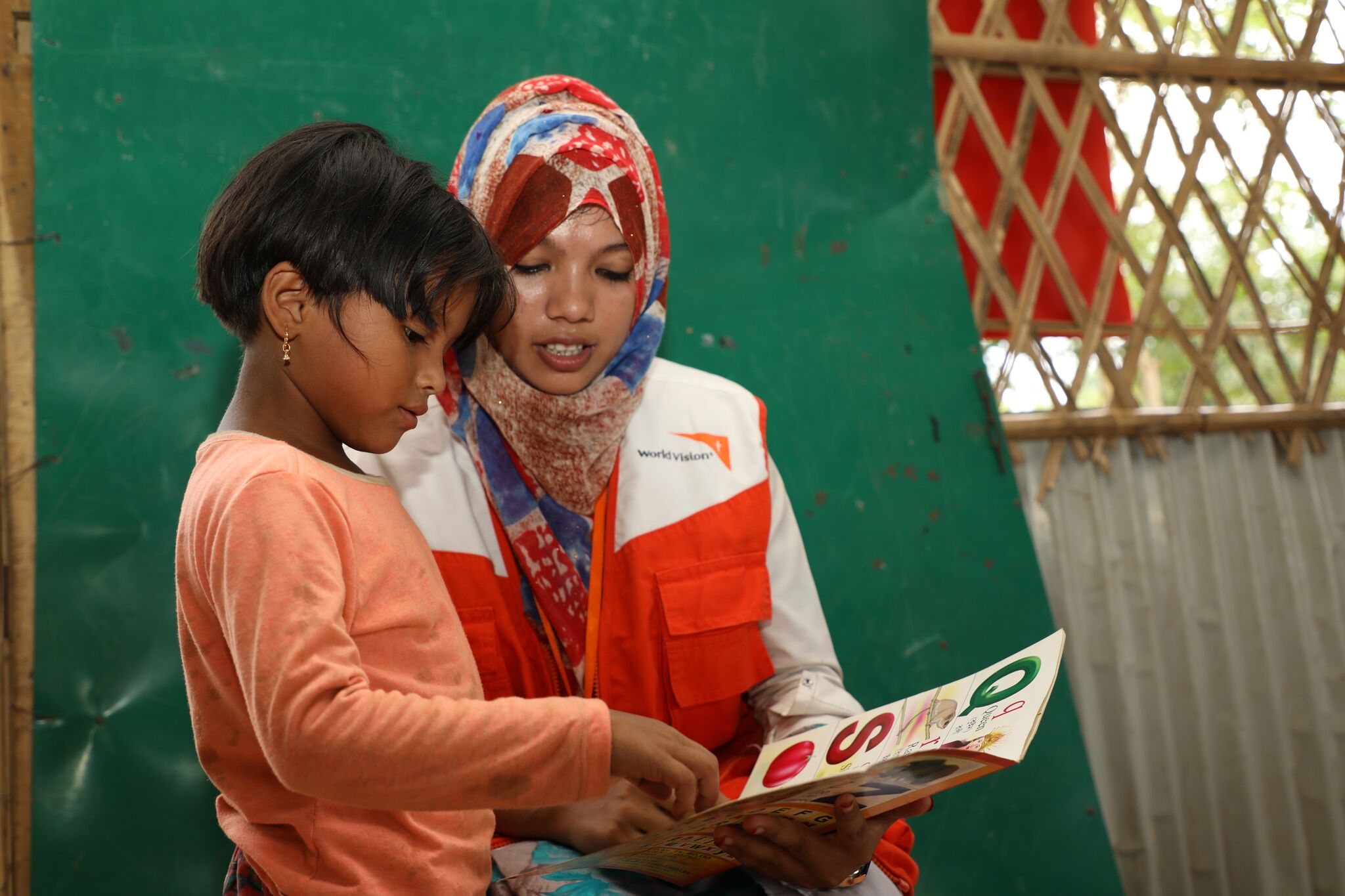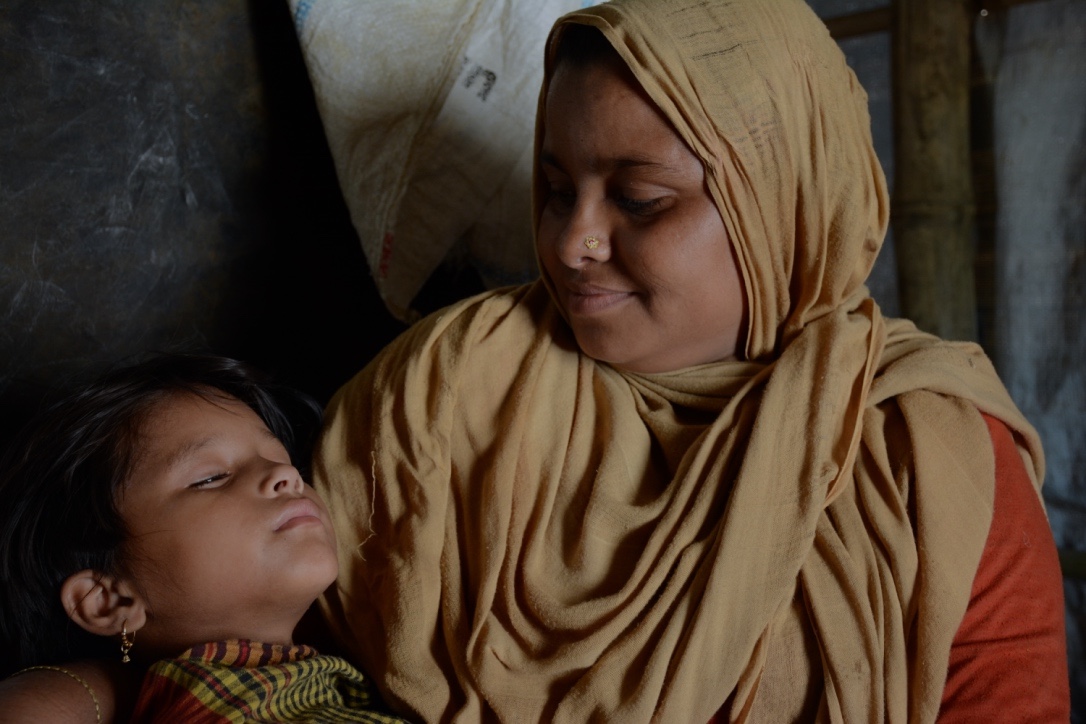Day in the life of a refugee mother
2:00 AM - Preparing the meal
During the month of Ramadan, I wake up very early to prepare sehri for my four-year-old daughter Jannatul and myself. This is the small meal we take before fajr, the dawn prayer. Usually, we eat rice and curry made from vegetables. But today I didn't have any dry firewood because of incessant monsoon rains, so I couldn't prepare any food.
4:05 AM - First prayer of the day
I pray fajr, our first prayer of the day before dawn. Morning comes very early here. The sun is up by 5:00 already. I go back to sleep after praying. Jannatul is still sleeping. I'm thankful that she doesn't have nightmares after all she has seen. She doesn't talk about it, but I know she remembers.
It happened last September. They arrived at night and started shooting. They set fire to our homes and burned our community to the ground. People were running everywhere. Jannatul was with me, but I didn't know what had happened to my husband, Mohamed, and my other two children. Later I saw them dead. Mohamed was shot. My son, Hafej, was just two-years-old. My baby, Kalima, was one. They were stabbed to death.
That night, we hid by a riverbank. At dawn, the people from my village to walk to Bangladesh. We walked for a week in the rain, and for three days we didn't eat. Jannatul was about to die when another family shared some rice with us. We were thankful. We saw so many people dying or dead on the roadside.
We finally crossed the Naf River into Bangladesh. We collapsed on the road. After a few days, we found a space to put a tent that we got from an NGO. We cleared a space on the top of a hill, cutting down the trees ourselves. We have been here for almost nine months. They say this is the largest refugee camp in the world now. It feels like it. It is so crowded.
6:00 AM – Selling food in the market
Before Ramadan began, I worked in a small food stall in the market in the camp. Now it is closed for the month. We refugees are not allowed to work, it is illegal. But I earn a little money at the food stall—about 100 taka a day [USD$1.25). [Taka is Bangladeshi currency.] I grind spices all day long—onion, ginger, chilli, turmeric, garlic, and mustard seeds for making curry. The owner gives me three meals a day. I pay 20 taka a day transport to get here and back, so I earn about 80 taka a day [USD$1.00]. I can buy firewood and a few vegetables with this money. I have no income when the food stall is closed.
8:00 AM – Fetching water
During Ramadan, we wake up at 8:00 AM later than usual. We eat a bit of rice from the night before. We go to fetch more water for drinking and cooking at a pump near our shelter. We can only store one jar-full in our shelter. The pump is only a few minutes' walk away at the bottom of the hill, but getting water takes much time because there is a big queue sometimes.
Yesterday I fell down while climbing up the hill to my shelter with a heavy jar of water. The steep pathway was slippery and muddy. I lost my footing in the rain.
Back at the shelter, we wash and I get Jannatul ready to go to the learning centre [a World Vision child-friendly space]. I'm thankful that it is right near our home.
9:00 AM - Dropping Jannatul at the center
I drop Jannatul at the centre. She loves playing there. There are no real schools operating in the camp. They are not allowed. I just want a stable place for Jannatul to be. Sometimes I am afraid to let her out of my sight. She is my only hope for the future.
I go to line-up if NGOs are giving out something. We will be in a line all day. It is very hot [33 degrees] and humid. We get rice, lentils and oil once a month [from World Food Programme]. We've eaten the same thing every day for nine months now. Every three months, we line up for sugar and milk powder that NGOs give out. I try to buy a few vegetables when I have a little money.
10:00 AM – Enjoying family time
In the morning, sometimes my sisters come over. We fled from Myanmar together-- my four sisters and our elderly parents. My father is blind. We took turns carrying him on the road. I carry the things we get from the NGOs for my parents because they are old. I also take them to health centres run by aid organizations when they are sick.
My one sister and I lost our husbands in the violence. My two other sisters are unmarried. We do not allow them to go outside to line-up for distributions. Men with bad intentions will stare at them, or yell bad words.
My sisters and I laugh a little together, as I make chutki. It is a special dish we prepare for Eid-ul-Fitr, the celebration at the end of Ramadan. We make it from rice powder, and then dry it and store it. We add sugar and milk when we cook it later.
1:00 PM – Finding firewood in the forest
I try to buy firewood. This is my biggest difficulty. I do not have anyone who can collect firewood for me from forests. It is too dangerous to send Janntul there. She could be assaulted or bitten by snakes. I buy firewood from others who collect and sell it, but I have very little money.
Noon - Prayer
Jannatul comes home from the learning centre, and I make some food for her. I am fasting so I do not eat. I pray juhr, the noon prayer.
2:00 PM - Breaktime
It's so very hot in the shelter, and it is raining outside. Jannatul and I take a nap.
In Myanmar, we had a garden and some cattle. I spent my days caring for them. Here I have nothing to do except cook for my daughter and queue up for supplies. We would happily go home back if we could be sure there would be peace. It's like the world has fallen in on my head. I feel helpless. I pass the days with my grief.
4:00 PM – A trip to the market
Jannatul and I go to the vegetable market sometimes in the afternoon, if it is not raining. I buy spinach, cucumbers, okra and bitter gourd that we like to cook. I spend one day of my pay to buy these vegetables.
4:30 PM – Afternoon prayer
I pray asr, the afternoon prayer. Then I begin to prepare some food to eat after breaking the fast. We will eat rice. We have not had meat in months.
6:35 PM – Breaking the fast
Finally, it is time to break the fast at sundown. We call this iftar. I take a small glass of water and eat a bit of gram. [chickpeas]
6:40 PM – Mother-daughter time
As the sun goes down, we pray the magrib prayer. I try to teach Jannatul the bit of Arabic that I know.
7:50 PM - Sleep
After we pray isha, the evening prayer, we prepare to sleep. There is no electricity in the shelter and we don't have a flashlight. The floor is hard. The monsoons arrived last week. Our shelter was shaking in the wind. Rainwater flowed down the hill behind us and flooded part of the floor. We were so afraid that we couldn't sleep. Jannatul was holding me tightly. We cannot lock the shelter's door. I have no one to protect us so I cannot let myself feel afraid.
World Vision helped us to strengthen our shelter before the rains started. Our house was in very bad shape before. I covered the roof with a cloth to try and keep the rain out. During one storm, I was afraid it was going to fly off. It's so much better now. I had no means to repair it on my own. It would have been wrecked by the winds. I cannot rebuild my shelter if it falls down or is destroyed. This place is our home, where at least I can dream about living and surviving with my daughter."
Background
*Salima (name has been changed), 25, and her daughter, Jannatul, 4, are among 883,000 people from Myanmar living in Cox's Bazar, Bangladesh--the world's largest, most densely populated refugee camp. World Vision has served more than 200,600 refugees here since the crisis began in August 2017.
Story and photos by: Karen Homer, Himaloy Joseph Mree, Xavier Sku (Response communications team in Bangladesh)

